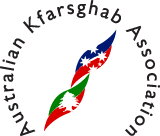The village of Kfarsghab lies in the north of Lebanon. Its people are of modest means but they manifest great spirituality and a love of their Christian faith. They come from a long line of Maronite Catholics. The village itself is situated in what is regarded in the north of Lebanon as a very holy and spiritually dearly held location – the Valley of Kadisha.
The Lebanese, in terms of their history, and in respect of the Christian population, have seen very hard and very pressing times with sustained persecution and economic hardship.
Kfarsghab is the birthplace of our forefathers and currently home to our close relatives and friends who did not immigrate. Kfarsghab is nestled in the northern mountain region of Lebanon approximately 1350 metres above sea level. The warmer months of the year are spent by our community in Kfarsghab because of its pleasant weather conditions in its elevated position. Our ancestors have been known to reside in the area since 1450.
Our village expanded in the 1500’s when our ancestors bought a parcel of land in the Morrh which is approximately 300 metres above sea level and is situated at the foothills of the mountains in North Lebanon. It is approximately 20 kilometres away from our summer village but is considerably lower. Being in a lower altitude the snow does not reach the village and weather conditions are milder during the cold winter months thereby escaping the heavy falls of snow that invariably occur in the winter months.
The Lebanese Kfarsghab are a peace loving, non-political Christian Maronite community who number 20,000 worldwide. Whilst 95% of our people live outside Lebanon, it is rare to see any of our ancestral lands sold to outsiders. It is still 100% owned by our Kfarsghab people throughout the world. We are known to be very protective of our birth rights and our lands. Our forefathers had the foresight many years ago to educate and encourage our children to do well so much so that today it has paid off handsomely whereby we can boast of the abundance of scholars and business excellence that we have inherited today. It is a proud achievement and a testament to the faith and trust of our fore generations.
Australia has in particular nurtured and fostered a multi-cultural atmosphere and environment. With this incentive and in these ideal conditions our Lebanese Kfarsghabi community has grown, adapted to, adopted from and implemented to the extent that there has been a real cooperation between our Australian comrades and our own people to enable an interaction of lifestyle and yet an ability to keep our separate identity, which we culturally cherish, in such an environment.
